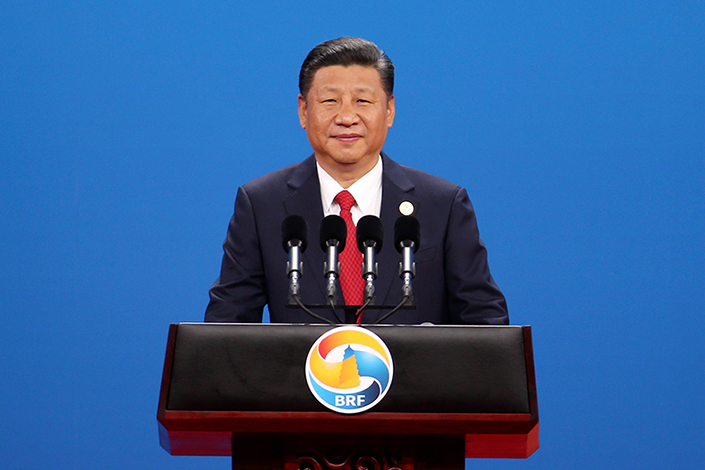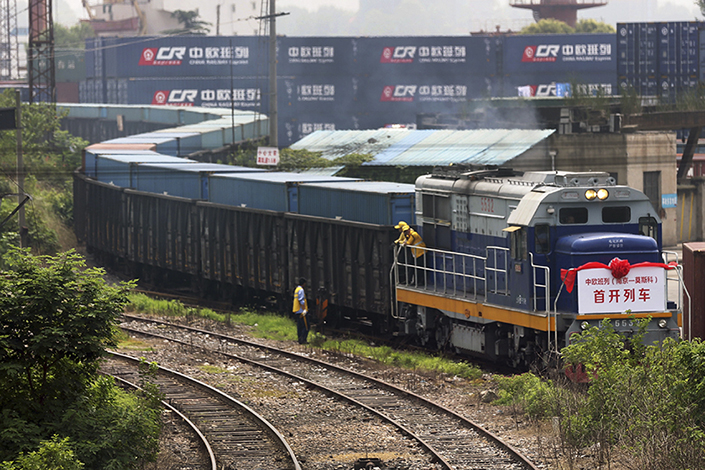China Touts More Than 270 Belt and Road Agreements

President Xi Jinping said he is glad to see positive responses and extensive support from the international community for the Belt and Road initiative, as representatives from more than 100 countries and international organizations wrapped up a two-day summit in Beijing on Monday.
Xi announced at a news conference late Monday that China will host another Belt and Road Summit in 2019, as participants have already been discussing gathering again to lay down more details of cooperation and plans in the cross-border initiative.
He also said that more than 270 cooperation projects or agreements have been signed during the summit, and China’s plans to host an international import exposition has garnered enthusiastic responses.
Currently, 68 countries and international organizations have signed Belt and Road agreements with China, Xi said.
The Belt and Road program, borrowing the idea of ancient Silk Road trade routes, was raised by Xi in 2013 and has developed into an all-out national strategy to beef up roads, railways, ports and industrial parks to better link China with Europe and Central Asia by land, and with Africa and Southeast Asia by sea.
At the roundtable meeting attended by 29 heads of state and government leaders on Monday, Xi listed the challenges facing the world, including sluggish economic recovery, a growing development gap, and the effects of refugee crises, terrorism and military conflicts.
Many countries have development plans to deal with the challenges. But only by aligning their policies and integrating economic factors and resources on a global scale can countries create synergy to promote peace, stability and shared development, Xi said.
He emphasized the inclusiveness of the Belt and Road initiative, describing it as a “brand of cooperation” that goes beyond regions, and can only be achieved by joint planning and action.
 |
The China Railway Express began running from Nanjing, Jiangsu province, to Moscow on June 29. Photo: Visual China |
China promised on Sunday to inject 100 billion yuan ($14.5 billion) into the Silk Road Fund, and to extend 380 billion yuan in loans to support Belt and Road infrastructure, manufacturing and financial projects.
World Bank President Jim Yong Kim told CCTV on Sunday that representatives participating in the summit showed great interest in the Belt and Road program, and just a few hours after the summit started, they were talking about returning to discuss detailed plans.
“People are saying, ‘How do we make it happen every year, so that the next time, instead of signing agreements and just introducing our ideas, we are actually working on making them happen?’” he told CCTV.
Kim said the World Bank is investing $90 million to the Belt and Road countries, but it lacks the political and economic power to make the process more effective.
He is glad that China has initiated the Belt and Road program to push forward cooperation in these regions.
The China Development Bank issued $168.2 billion in countries along the Belt and Road routes between 2013 and 2016, bank President Zheng Zhijie told CCTV on Sunday. The money was used in energy, mining, transport infrastructure and other areas, he said. The bank has served nine countries along the routes, including Kazakhstan, Laos, Cambodia and Kuwait.
It has also participated in the planning of three economic corridors, including China-Mongolia-Russia, China-Pakistan, and Bangladesh-China-Indonesia-Myanmar, Zheng said.
IMF Managing Director Christine Lagarde discussed on Sunday three policy priorities for better financial connectivity to the Belt and Road initiative.
Emerging and developing countries should improve their business and regulatory environment to attract foreign direct investment in high-quality infrastructure. The second policy priority is to push for more financial inclusion, Lagarde said at the summit.
She also urged countries to harness the power of fintech, or financial technology. She used China as an example in utilizing this power, saying that people can live without cash in Chinese cities such as Beijing and Hangzhou thanks to mobile payment platforms like Alipay and WeChat.
The People’s Bank of China recently established a special commission on fintech to better coordinate the development and application of financial technology and manage its risks.
China also signed economic and trade agreements with more than 30 countries over the past few days.
China and Georgia signed a free trade agreement on Saturday in Beijing, which will take effect later this year or the beginning of next year, the official Xinhua News Agency reported.
China will levy zero taxes on 93.9% of products from Georgia, which will levy a zero percent tax on 96.5% of products from China.
Contact reporter Wu Gang (gangwu@caixin.com)

- 1Cover Story: China Carves Out a Narrow Path for Offshore Asset Tokenization
- 2Drownings Shake Chinese Enthusiasm for Travel to Russia
- 3China Business Uncovered Podcast: A $15 Billion Bitcoin Seizure and the Fall of a Cybercrime Kingpin
- 4Over Half of China’s Provinces Cut Revenue Targets
- 5Li Ka-Shing’s Port Empire Hit by Forced Takeover Amid Panama Legal Dispute
- 1Power To The People: Pintec Serves A Booming Consumer Class
- 2Largest hotel group in Europe accepts UnionPay
- 3UnionPay mobile QuickPass debuts in Hong Kong
- 4UnionPay International launches premium catering privilege U Dining Collection
- 5UnionPay International’s U Plan has covered over 1600 stores overseas



